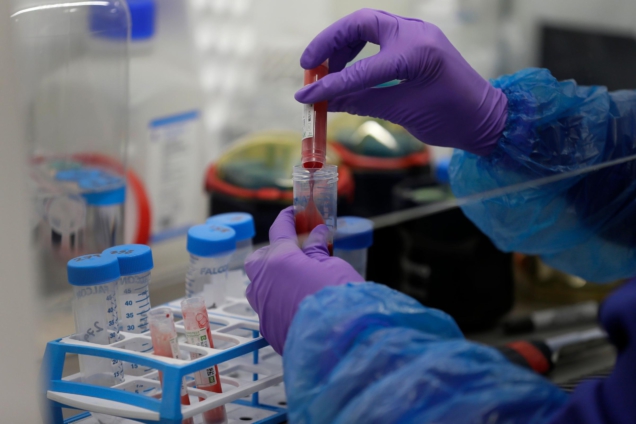One of two Brazilian coronavirus variants has been detected in the UK, a leading British virologist has said.
Speaking during a new variant research group briefing, Professor Wendy Barclay said: "There are two different types of Brazilian variant and one of them has been detected in the UK."
Prof Barclay, head of the G2P-UK National Virology Consortium - a panel of experts set up specifically to look at new coronavirus variants - said it was probably introduced "some time ago".
She said: "In the databases, if you search the sequences, you will see that there is some evidence for variants from around the world, and, I believe, including the Brazilian one, which probably was introduced some time ago.
"And that will be being traced very carefully."
Prof Barclay, chair of influenza virology at Imperial College London, said one of the two Brazil variants was picked up in Japan from some Japanese people who had travelled from Brazil, and the other is "more prevalent in Brazil".
She did not clarify whether the variant she said had arrived in the UK is the variant that is causing concern.
A ban on travellers entering the UK from across South America, the Central American state of Panama, Portugal due to its strong travel links with Brazil and the former Portuguese colony of Cape Verde came into force at 4 am today.
Scientists analysing the new Brazilian variants believe the mutations they share with the new South African strain are associated with a rapid increase in cases in locations which have seen large Covid-19 outbreaks.
The new, more transmissible, variant in Brazil has seen a mass transfer of Covid-19 patients out of Manaus, the Amazon's largest city, as it struggles with a shortage of oxygen tanks.
Videos of the situation spread across social media, with distraught relatives of Covid-19 patients in Manaus asking people to buy oxygen for them.
Official data shows the city's 14-day death figures are approaching the peak of last year's first wave, as a paper published this week indicated the new strain had been circulating in the city of two million people since mid-December.
The G2P-UK group, which was launched today, is made up of scientists from a variety of specialisms who will assess new COVID-19 variants for whether they will be more transmissible or resistant to current vaccines.
They will aim to give those scientific assessments to the UK government before any new variants spread widely so policies can be amended to prevent that.
Latest Stories
-
Gold Fields Ghana Foundation challenges graduates to maximize benefits of community apprenticeship programme
14 mins -
GBC accuses Deputy Information Minister Sylvester Tetteh of demolishing its bungalow illegally
25 mins -
Boost for education as government commissions 80 projects
37 mins -
NAPO commissions library to honour Atta-Mills’ memory
48 mins -
OmniBSIC Bank champions health and wellness with thriving community walk
49 mins -
Kora Wearables unveils Neo: The Ultimate Smartwatch for Ghana’s tech-savvy and health-conscious users
53 mins -
NDC supports Dampare’s ‘no guns at polling stations’ directive
56 mins -
Police officer interdicted after video of assault goes viral
1 hour -
KNUST’s Prof. Reginald Annan named first African recipient of World Cancer Research Fund
1 hour -
George Twum-Barimah-Adu pledges inclusive cabinet with Minority and Majority leaders
2 hours -
Labourer jailed 5 years for inflicting cutlass wounds on businessman
2 hours -
Parliament urged to fast-track passage of Road Traffic Amendment Bill
2 hours -
Mr Daniel Kofi Asante aka Electrician
2 hours -
Minerals Commission, Solidaridad unveils forum to tackle child labour in mining sector
2 hours -
Election 2024: Engagement with security services productive – NDC
2 hours

